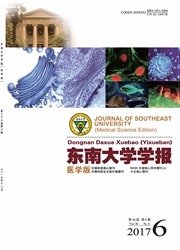

 中文摘要:
中文摘要:
目的:研究同种异基因皮肤移植的排斥反应对小鼠抗肿瘤能力的影响。方法:将BALB/c鼠(H-2~d基因型)分成同种皮肤移植组(C57BL/6鼠为供者,H-2b基因型)、同系皮肤移植组(其他BALB/c鼠为供者)和未移植组,分别皮下接种C57BL/6鼠来源的黑色素瘤细胞(B16,H-2b基因型)或者BALB/c鼠来源的骨髓瘤细胞(SP2/0,H-2~d基因型),观察移植排斥和肿瘤生长情况,检测脾细胞群中的CD3~+、CD8~+T细胞和H-2K~b同种反应性CD8~+T细胞的比例以及肿瘤组织中CD3~+T细胞的浸润程度。结果:B16细胞接种同种皮肤移植组小鼠后瘤体生长缓慢,直至完全消失,而接种同系皮肤移植组小鼠和未移植组小鼠后瘤体生长迅速;SP2/0细胞接种同种皮肤移植组小鼠、同系皮肤移植组小鼠和未移植组小鼠后瘤体均生长迅速,3组之间差异无统计学意义。同种皮肤移植鼠脾细胞群中针对H-2K~b移植抗原的同种反应性CD8~+T细胞比例明显高于同系皮肤移植鼠。结论:同种皮肤移植引起的排斥反应只对拥有同种异基因的肿瘤细胞具有排斥作用,而对与受者基因同源的肿瘤细胞并无明显的交叉免疫反应。
 英文摘要:
英文摘要:
Objective:To investigate the influence of skin allograft rejection on the anti-tumor effects in mice . Methods:BALB/c mice (H-2d genotype) were randomly assigned to 1 of 3 groups named as allograft group grafted with skin from C57BL/6 mice (H-2b genotype),syngeneic graft group grafted with skin from other BALB /c mice, and no graft group,respectively.Each mouse was administered subcutaneously with melanoma cells ( B16,H-2b genotype) derived from C57BL/6 mouse,or myeloma cells (SP2/0,H-2d genotype) derived from BALB/c mouse. The graft survival and tumor growth were then followed up .The percentages of spleen CD 3 +,CD8 +T cell and H-2Kb-alloreactive CD8 +T cell as well as the infiltration of CD 3 +T cell in tumor tissue were detected .Results:After B16 cells injection, tumor progressed very fast in both syngeneic graft group and no graft group , but a marked reduction in melanoma growth was found in allograft group followed by a complete tumor regression .After SP2/0 cells administration ,rapid tumor progression was found in allograft group ,syngeneic graft group and no graft group , with no differences on tumor growth curves .A higher frequency of H-2Kb-alloreactive CD8 +T cells was detected in the allograft mice compared with the syngeneic graft mice .Conclusion: Alloskin graft rejection may facilitate the rejection of allogeneic tumor cells ,but cannot cross-react with syngeneic tumor cells .
 同期刊论文项目
同期刊论文项目
 同项目期刊论文
同项目期刊论文
 期刊信息
期刊信息
